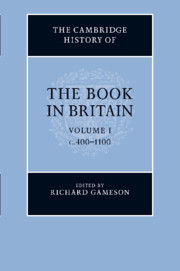Book contents
- Frontmatter
- 1 From Vindolanda to Domesday: the book in Britain from the Romans to the Normans
- PART I THE MAKING OF BOOKS
- PART II THE CIRCULATION OF BOOKS
- PART III TYPES OF BOOKS AND THEIR USES
- 15 The book in Roman Britain
- 16 The use of the book in Wales, c. 400–1100
- 17 The biblical manuscripts of Anglo-Saxon England
- 18 Anglo-Saxon gospel-books, c. 900–1066
- 19 Liturgical books
- 20 Anglo-Saxon prayerbooks
- 21 Psalters
- 22 Music books
- 23 Anglo-Saxon schoolbooks
- 24 Law books
- 25 Manuscripts of the Anglo-Saxon Chronicle
- 26 Old English homiliaries and poetic manuscripts
- PART IV COLLECTIONS OF BOOKS
- PART V CODA
- Bibliography
- Concordance of named manuscripts
- Index of manuscripts
- General Index
- Plate 4.1: The Lindisfarne Gospels"
- Plate 5.1: The Lichfield/St Chad Gospels"
25 - Manuscripts of the Anglo-Saxon Chronicle
from PART III - TYPES OF BOOKS AND THEIR USES
Published online by Cambridge University Press: 28 March 2012
- Frontmatter
- 1 From Vindolanda to Domesday: the book in Britain from the Romans to the Normans
- PART I THE MAKING OF BOOKS
- PART II THE CIRCULATION OF BOOKS
- PART III TYPES OF BOOKS AND THEIR USES
- 15 The book in Roman Britain
- 16 The use of the book in Wales, c. 400–1100
- 17 The biblical manuscripts of Anglo-Saxon England
- 18 Anglo-Saxon gospel-books, c. 900–1066
- 19 Liturgical books
- 20 Anglo-Saxon prayerbooks
- 21 Psalters
- 22 Music books
- 23 Anglo-Saxon schoolbooks
- 24 Law books
- 25 Manuscripts of the Anglo-Saxon Chronicle
- 26 Old English homiliaries and poetic manuscripts
- PART IV COLLECTIONS OF BOOKS
- PART V CODA
- Bibliography
- Concordance of named manuscripts
- Index of manuscripts
- General Index
- Plate 4.1: The Lindisfarne Gospels"
- Plate 5.1: The Lichfield/St Chad Gospels"
Summary
The systematic analysis of manuscripts containing versions of the text known as the Anglo-Saxon Chronicle originated during the reign of Queen Elizabeth I, as part of an attempt to assemble and organise information about the available sources for English history. In 1565 (or thereabouts) John Joscelyn, chaplain and Latin secretary to Matthew Parker, archbishop of Canterbury, constructed a list of six manuscripts each designated ‘Chronica Saxonica’. He arranged his list in an order determined by the point at which each chronicle ended (977, [1001], 1006, 1066, 1080, 1148), numbering them accordingly (1–6), indicating in each but one case the manuscript’s apparent or supposed place of origin, and identifying its current owner. All six of the manuscripts listed by Joscelyn survive to the present day, though one must add to his list one manuscript which he had overlooked, and a twelfth-century leaf from a manuscript now lost. The seven manuscripts, and one fragment, have been known since 1848 by letters of the alphabet (A–H), symbolising the continued recognition of their collective identity as a group of related texts. (Further details of each manuscript are given in the appendix at the end of this chapter, pp. 551–2.)
The fact that these manuscripts are known collectively as the Anglo-Saxon Chronicle creates the impression (for the unwary) that they constitute a single continuous narrative: official in status, consistent in nature and uniform in authority. It is an impression which might be compounded by a cursory reading of the annals themselves: laconic, impersonal, seemingly objective, driven only by the changing pace of events, with little sense of direction or deeper purpose. Of course the truth was quite different. The compilation of the original ‘common stock’ lies clearly enough in the reign of King Alfred the Great (871–99), though scholars differ in their views of the precise extent of the original work (whether it continued to 890, 891 or 892).
Keywords
- Type
- Chapter
- Information
- The Cambridge History of the Book in Britain , pp. 537 - 552Publisher: Cambridge University PressPrint publication year: 2011
- 4
- Cited by



